#Pilate Sentencing Jesus
Explore tagged Tumblr posts
Text
had a dream about the Tsaritsa and she was creepy as fuuuuck
#n's ramblings#n talks source#there was also a guy named Pontius (as in Pilate [as in the guy who sentenced Jesus])
0 notes
Text
The Sentence That Wasn't a Sentence: What Exactly Did Pilate MEAN?
One of the most unusual testimonies about who Jesus was is expressed in a short sentence that wasn’t a legal sentence: “I find no fault in this man.” Consider the reactions of Pontius Pilate and his wife: “While he [Pilate] was sitting on the judgment seat, his wife sent him a message, saying, “Have nothing to do with that righteous Man; for last night I suffered greatly in a dream because of…
#eyewitness#Jesus#John 18:36-37#John 19:11#Luke 23:3-4#Matthew 27:19#Pontius Pilate#sentence#testimony
0 notes
Text
I am fully aware that I may lose respect from some Catholics here on Tumblr for saying this, but I honestly do not care. I’m enraged that I even have to say this, but I’m going to anyway.
Lately, I’ve been seeing SO many Catholics on social media talking about how bad the Jews are, how they’re sinners for not turning to Jesus, and all those other sickening diatribes. So if you’re one of these people, I have a message for you.
You are also a sinner. I am also a sinner. Your neighbor is also a sinner. Your parish priest is also a sinner. Your husbands, wives, and parents are also sinners. Your bishop is a sinner. Even the Holy Father, Pope Francis himself, is a sinner.
So why, then, are the sins of the Jews suddenly so much more severe than yours or mine? And don’t come at me with all that, “the Jews killed Jesus” tripe. The Sanhedrin didn’t even have the authority to carry out the death sentence. What do you think Pilate was there for?
So, again, why are the sins of the Jews so much worse than ours, in the minds of my fellow so-called “Catholics?” I’ll tell you why. It’s because, to them, of the simple fact that the Jews are Jews, and they have the audacity to exist with us in the world. That is called discrimination, bigotry, and racism, and none of those things have any place in Holy Mother Church.
This entire discourse is rooted in hate. And hate does not come from God. It comes from SATAN. And I will have NOTHING to do with Satanic hatred of Jews, or of any group.
Because Jesus didn’t only die for Christians. He died for Muslims. He died for Hindus. He died for Buddhists. He died for Republicans. He died for Democrats. He died for black people. He died for Hispanic people. He died for Asian people. He died for African people. He died for straight people. He died for gay people. He died for trans people.
He died for us all. And yes, He died even for the Jews.
Repent, take up your cross, and believe the good news.
+JMJ+
222 notes
·
View notes
Text




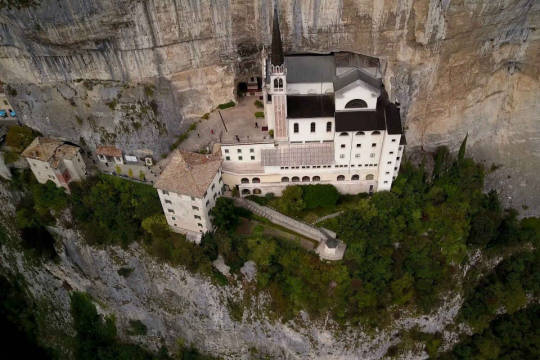

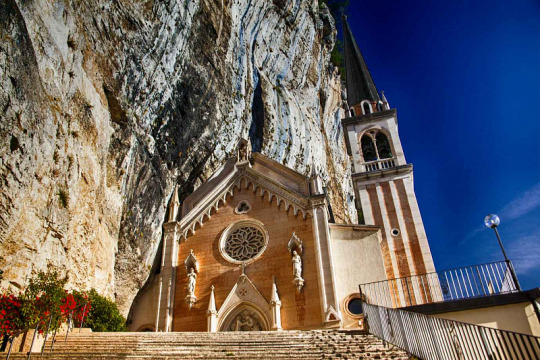
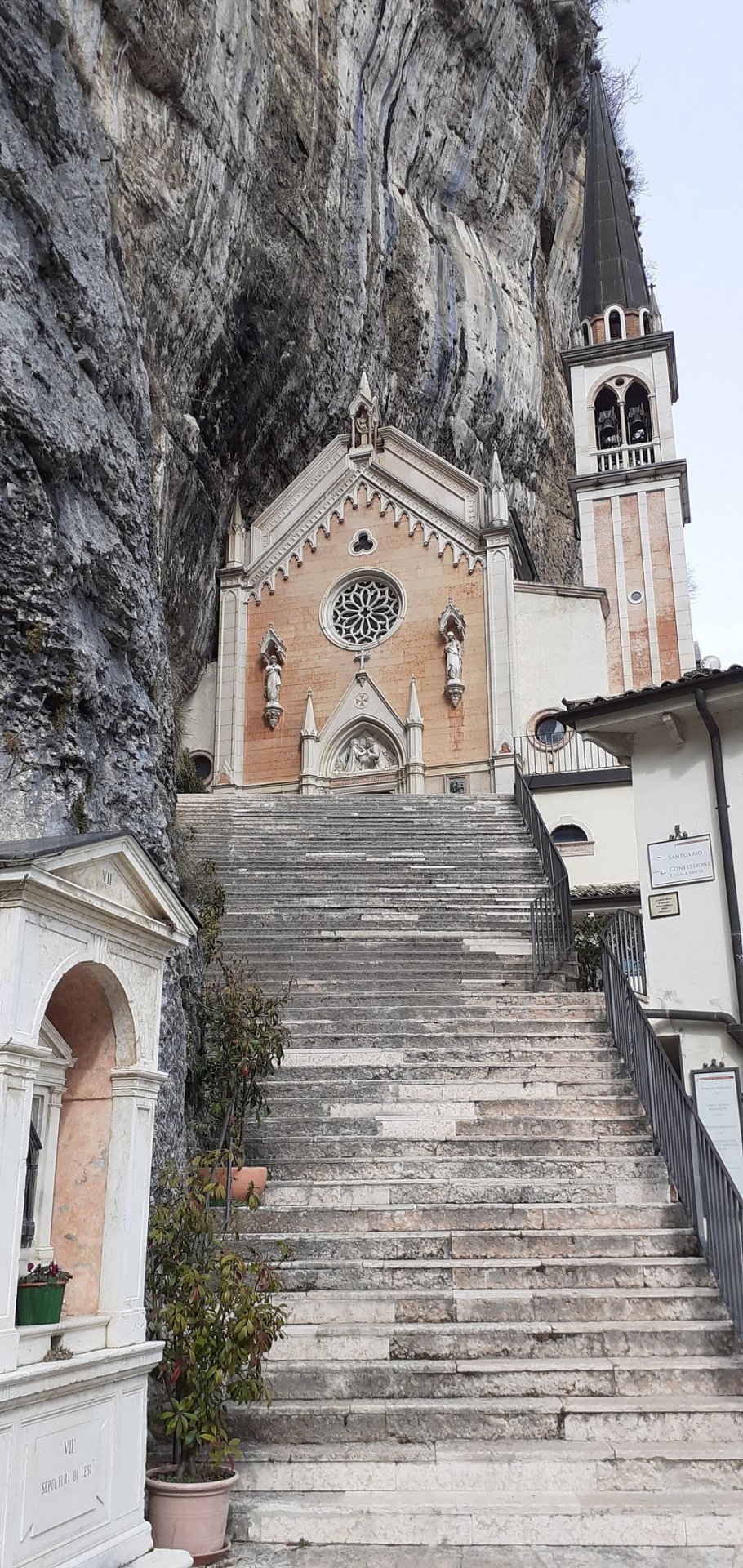
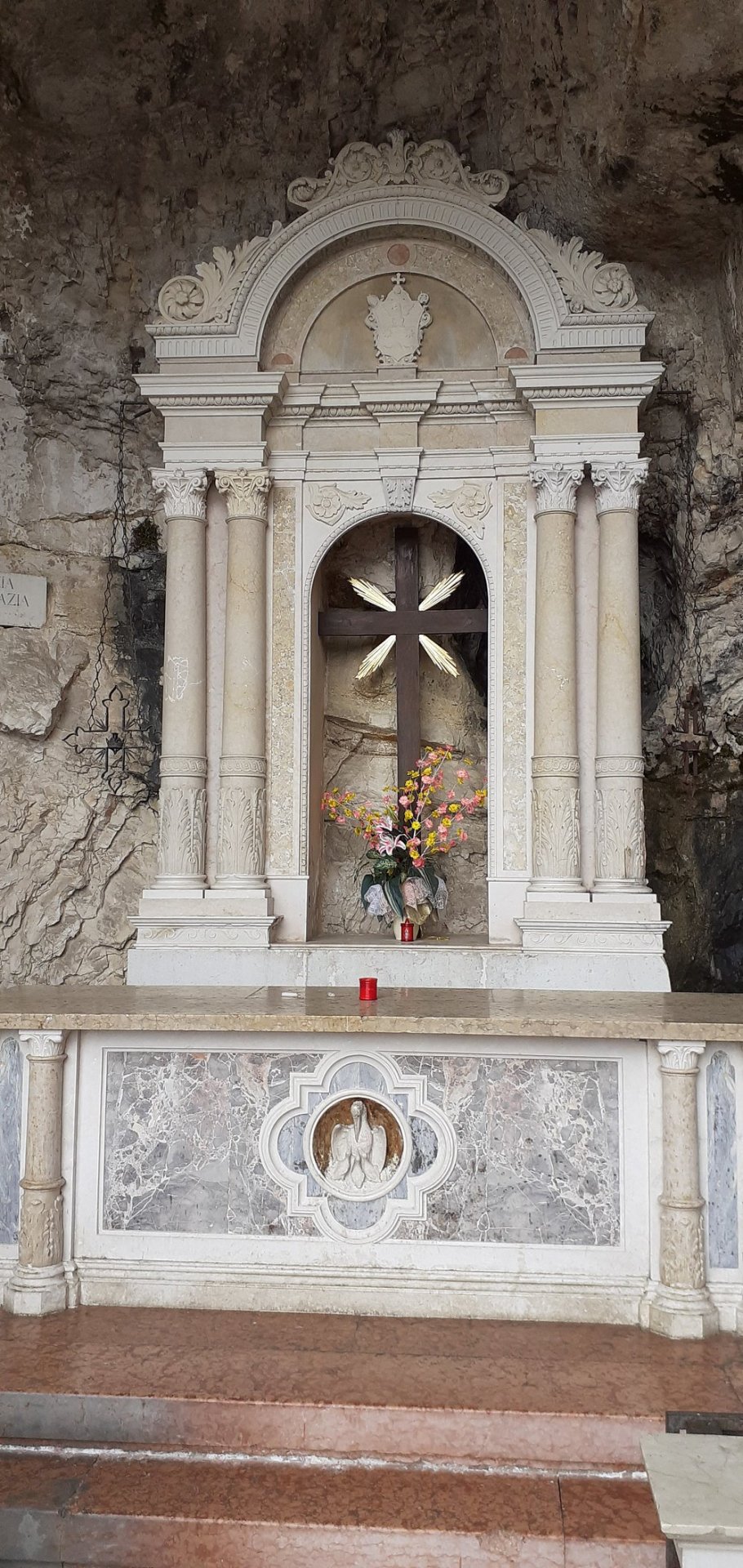
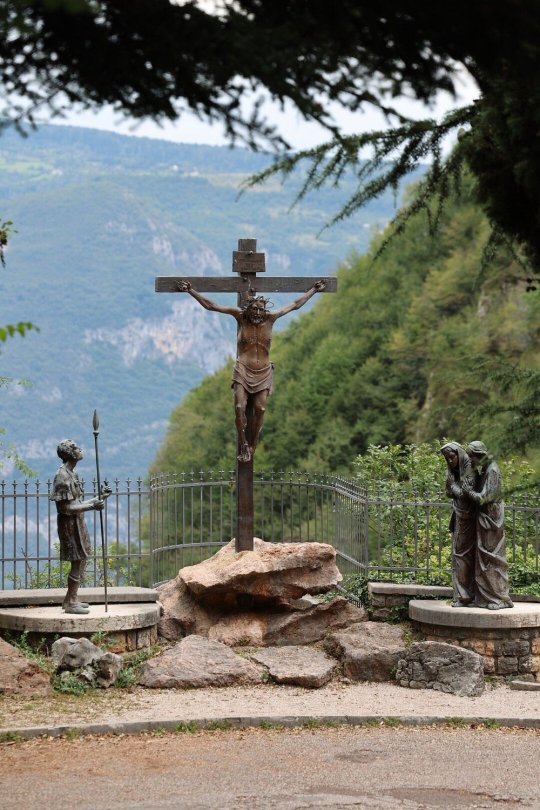
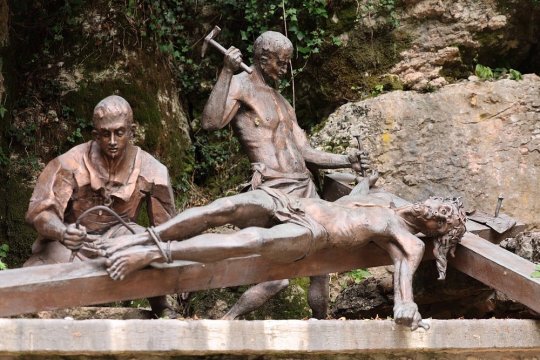
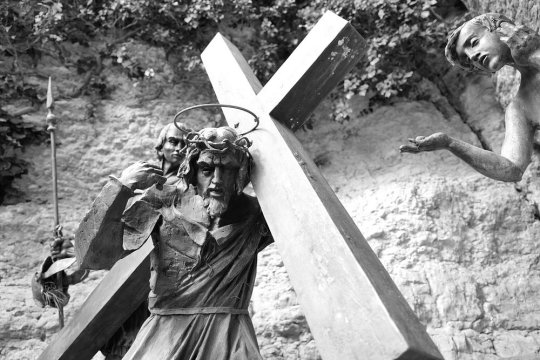
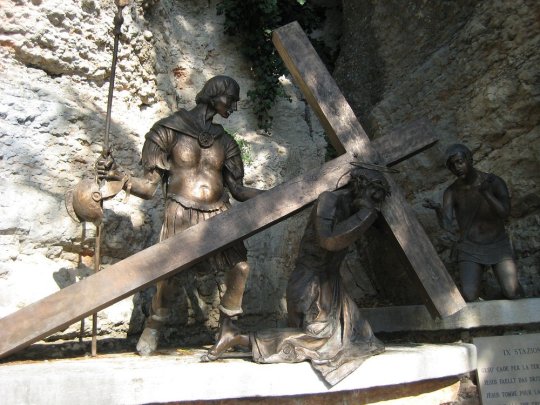
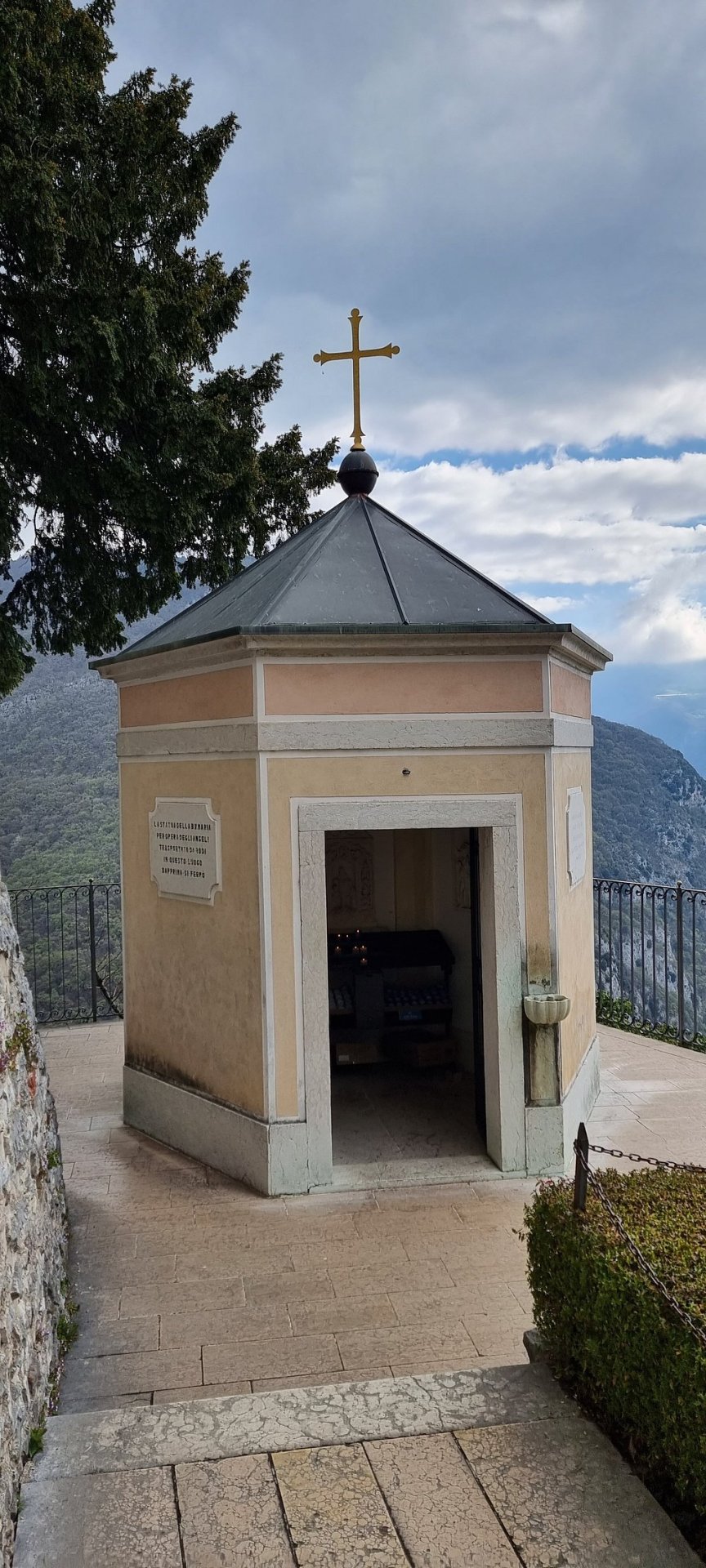
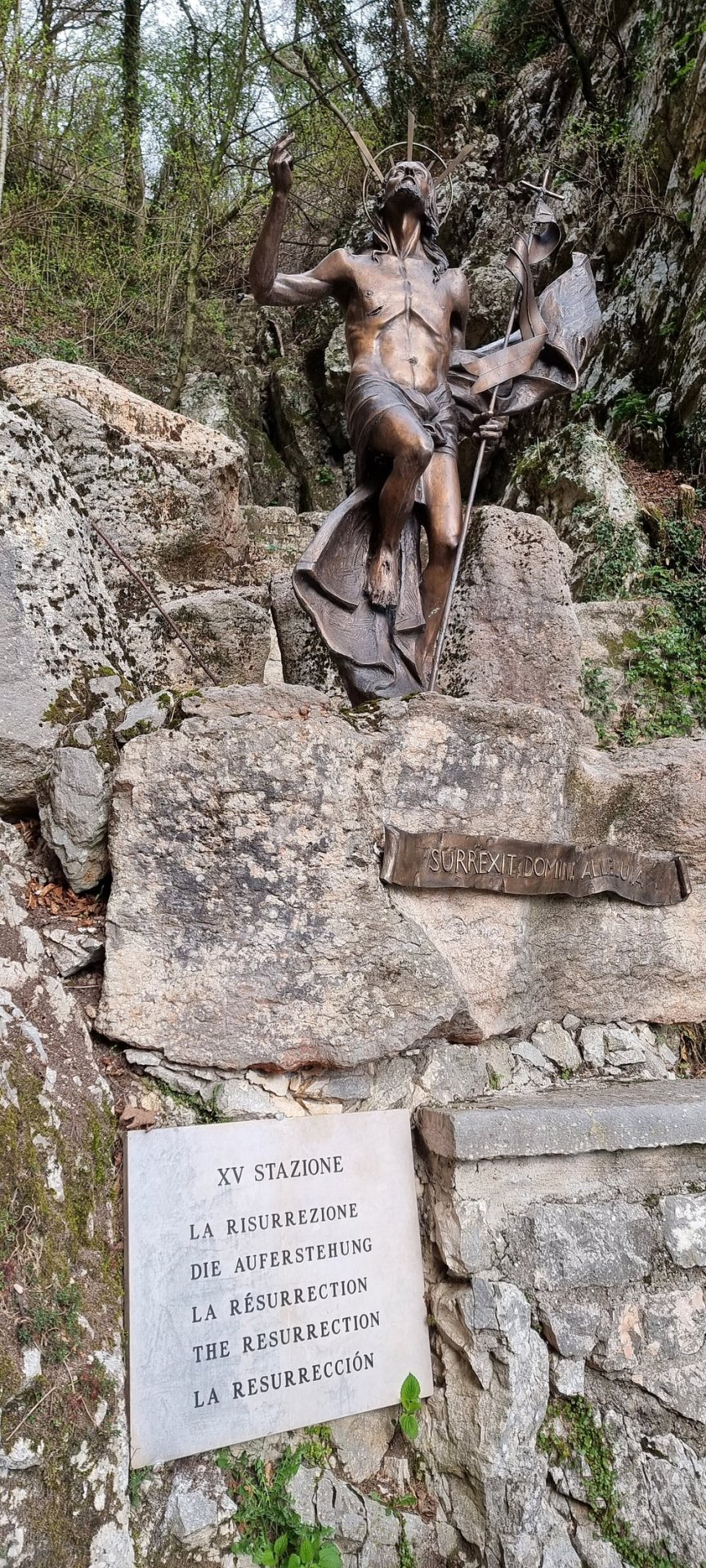
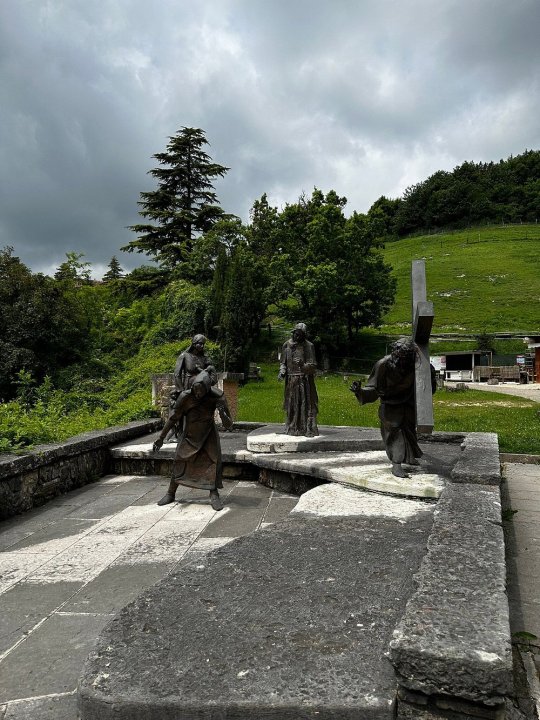
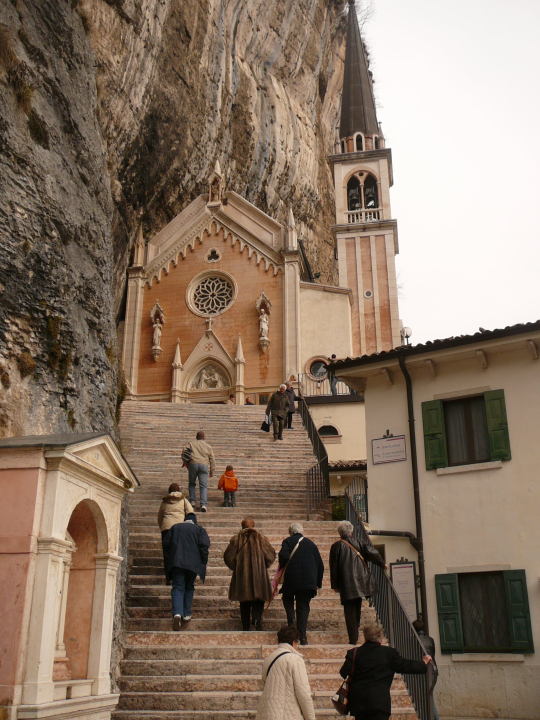
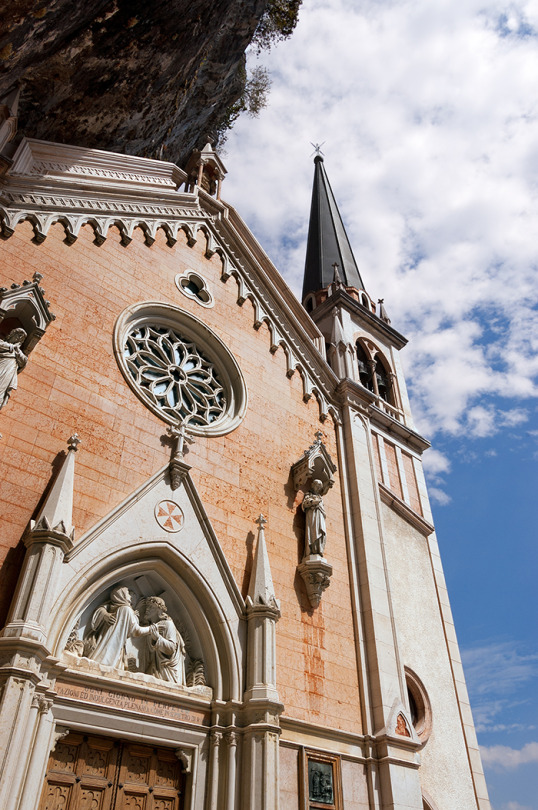

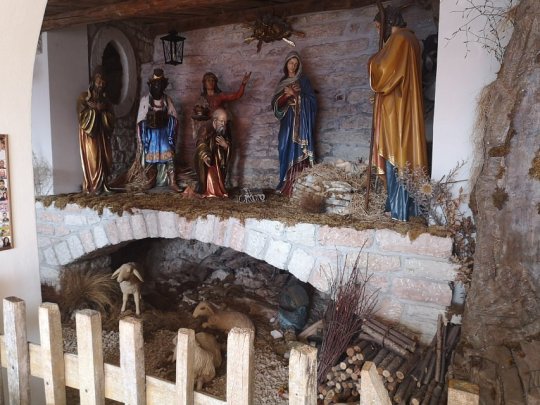
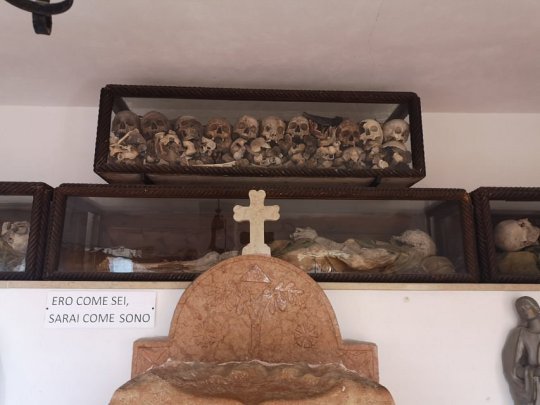
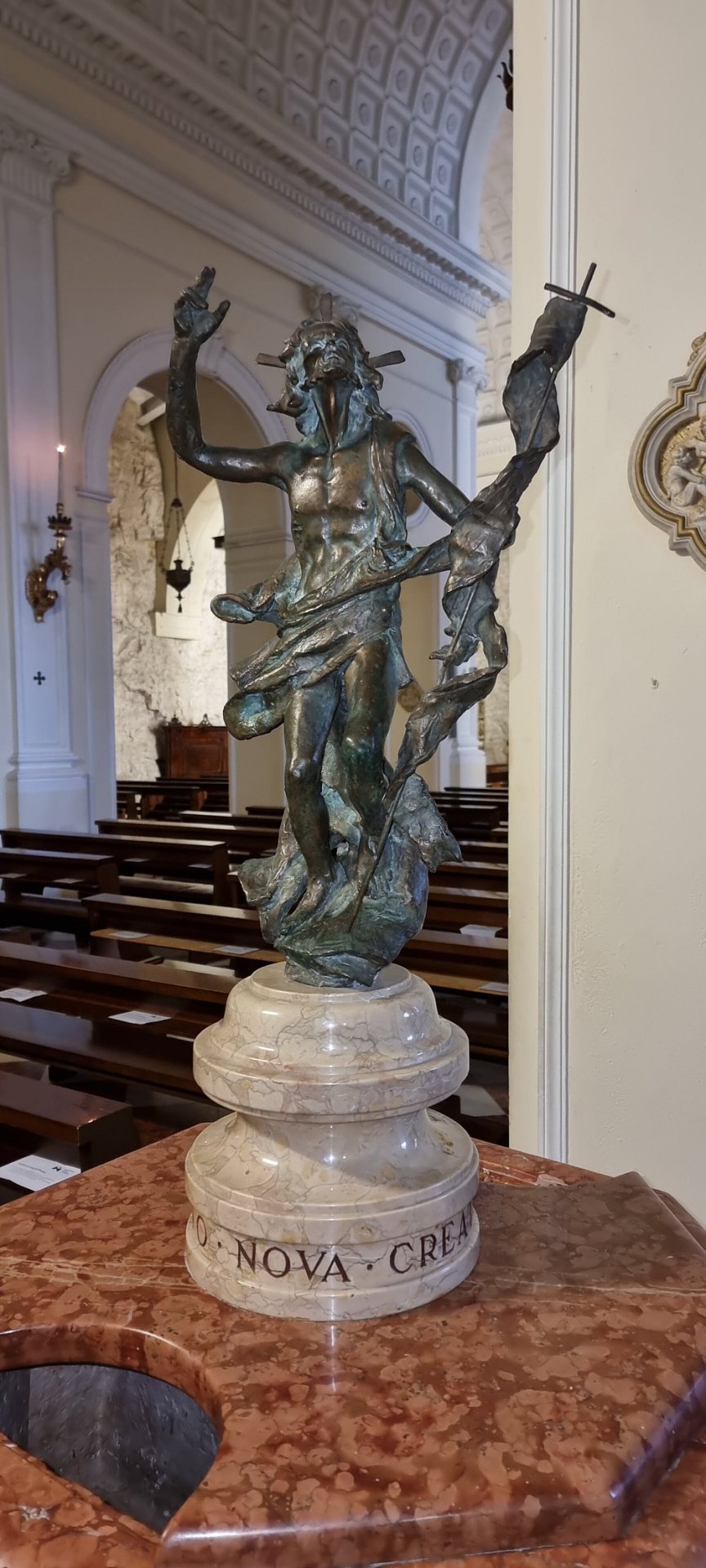
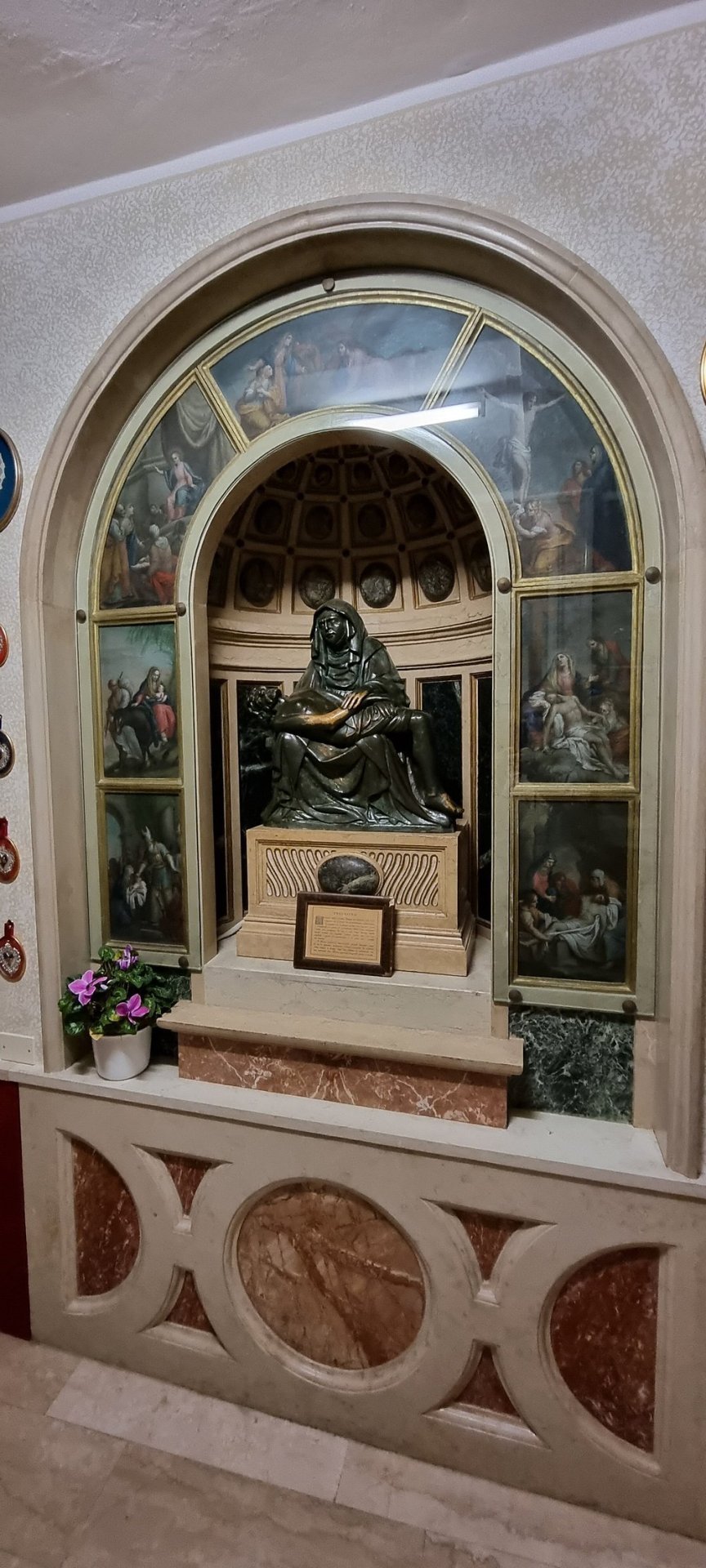
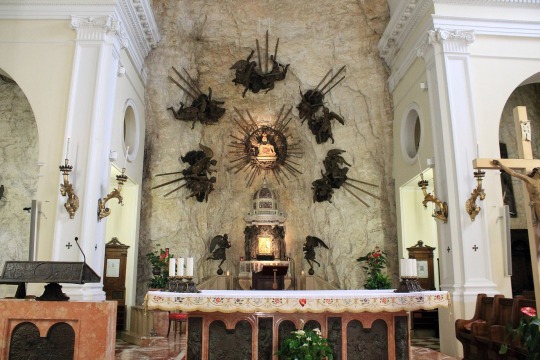
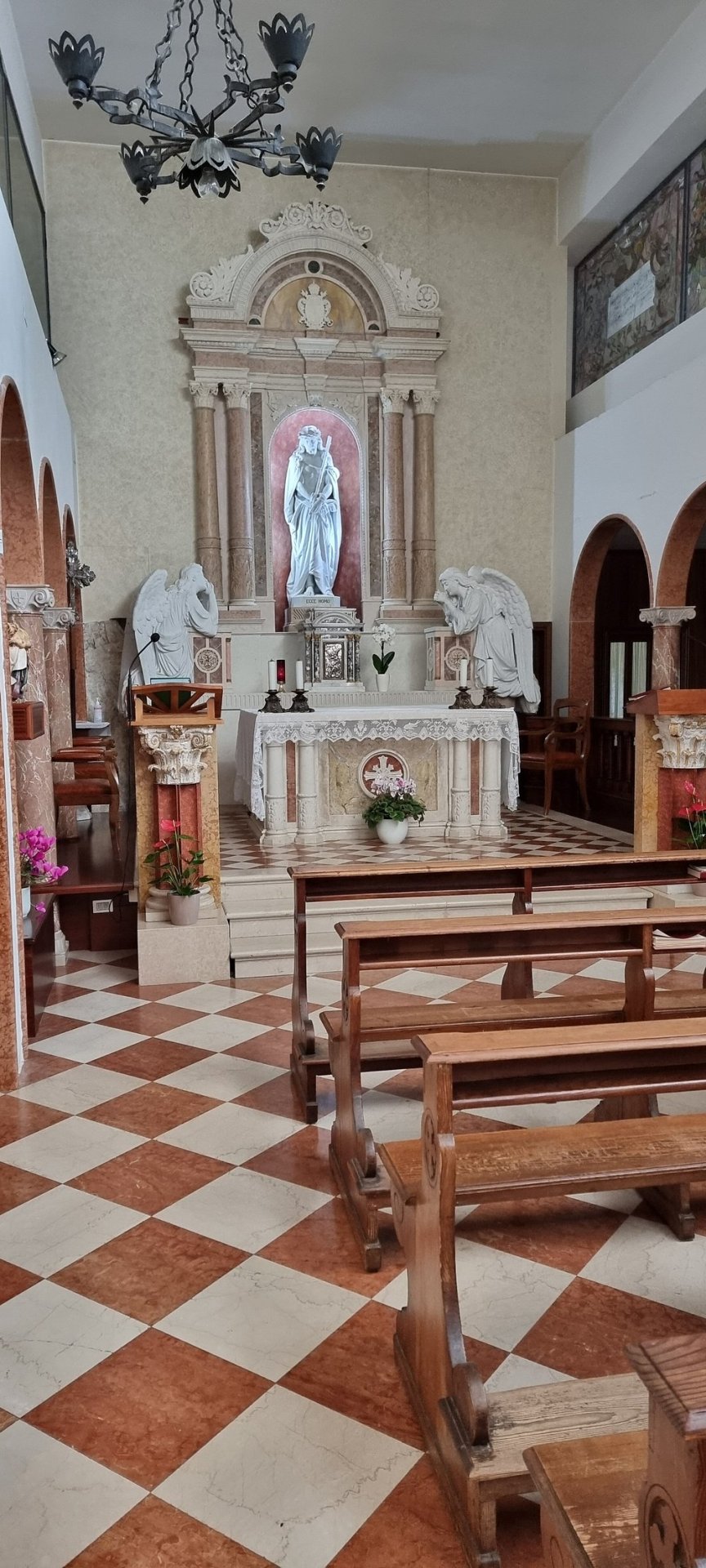
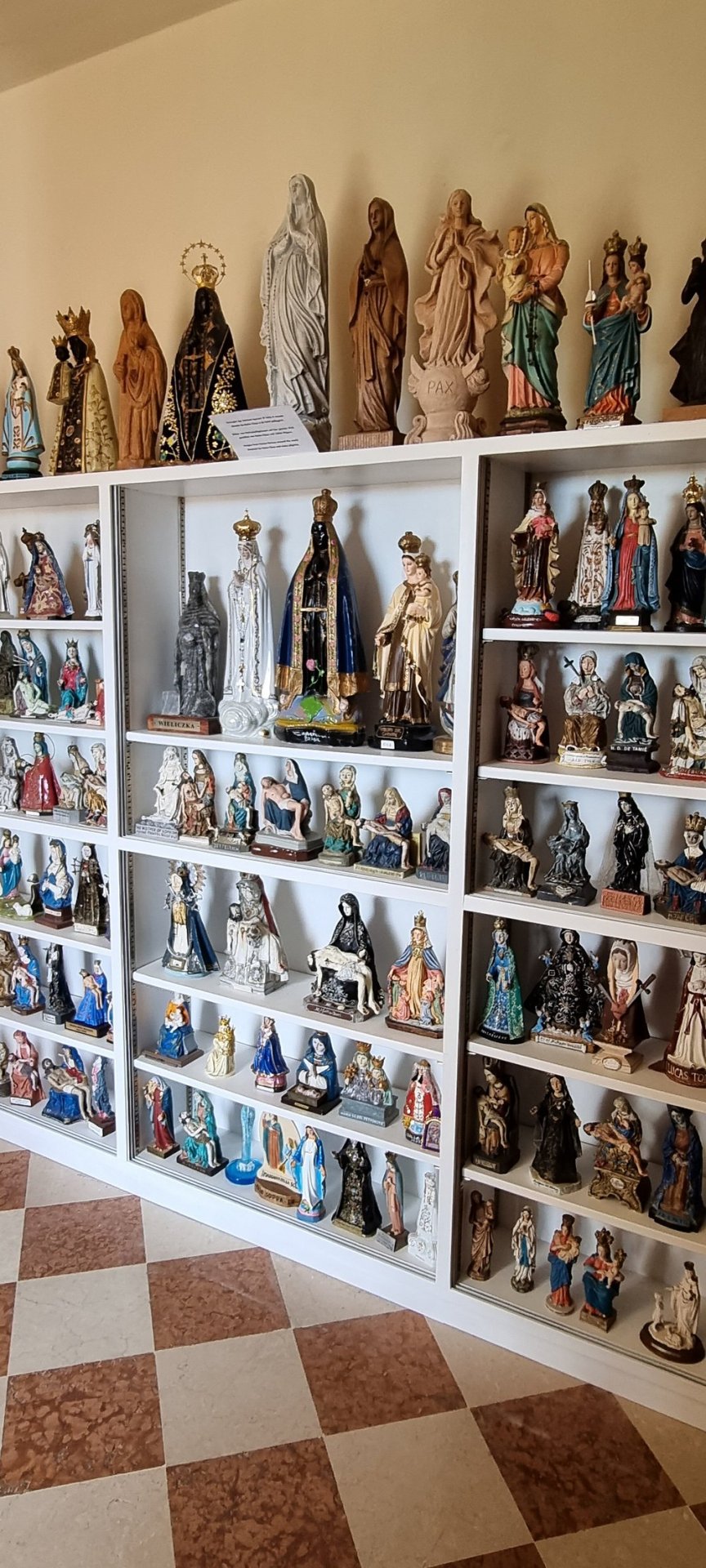
Святилище Богоматери Короны (Santuario Madonna della Corona).
Святилище Мадонны делла Корона находится в деревне Спьяцци, в провинции Верона. Этот церковный комплекс построен прямо в скальной стене горы Бальдо в Альпах, на высоте 774 метров над уровнем моря. Под ним расположена долина реки Адиже, а над ним возвышаются утес и бескрайнее небо.
Считается, что около 1000 года благочестивые отшельники, связанные с аббатством Святого Зено в Вероне, основали на горе Бальдо религиозное убежище. К XIII веку здесь уже существовал монастырь. По легенде, строительство святилища началось в 1522 году, когда статуя Мадонны чудесным образом была перенесена с острова Родос на это место «по воле ангелов» после захвата Родоса османскими войсками. В 1530 году на месте чуда была построена часовня, а через столетие — более крупная церковь. Последние значительные работы по реконструкции проходили в 1970-х годах под руководством архитектора Гвидо Тисато. Ранее, в XIX веке, святилище подверглось неоготической перестройке, но позднее его признали нестабильным. Сегодня оно полностью восстановлено и безопасно для посещения.
В средние века в монастырь снизу вела опасная горная тропа, и это был единственный путь. Впоследствии построили мосты, деревянные и каменные лестницы, затем — дорогу на горе, по которой теперь автобус доставляет людей. По лестнице паломники/пилигримы поднимаются до сих пор. Тропа «Путь Надежды» начинается от города Брентино Беллуно. Вверх через лес ведут 1500 ступенек. В среднем на такой подъем в монастырь пилигримы тратят 2 часа.
Кроме того, внутри здания находится Святая лестница (Scala Santa), считающаяся точной копией лестницы во дворец Пилата, по которой Иисус поднимался, чтобы услышать смертный приговор.
Sanctuary of Madonna della Corona (Santuario Madonna della Corona).
The Sanctuary of Madonna della Corona is located in the village of Spiazzi, in the province of Verona. This church complex is built directly into the rock wall of Mount Baldo in the Alps, at an altitude of 774 meters above sea level. Below it is the valley of the Adige River, and above it rises a cliff and an endless sky.
It is believed that around the year 1000, pious hermits associated with the Abbey of San Zeno in Verona founded a religious retreat on Mount Baldo. By the 13th century, a monastery already existed here. According to legend, the construction of the sanctuary began in 1522, when the statue of the Madonna was miraculously transferred from the island of Rhodes to this place “by the will of angels” after the capture of Rhodes by Ottoman troops. In 1530, a chapel was built on the site of the miracle, and a century later, a larger church. The last significant reconstruction work took place in the 1970s under the direction of the architect Guido Tisato. Earlier, in the 19th century, the sanctuary underwent a neo-Gothic reconstruction, but it was later recognized as unstable. Today, it is fully restored and safe to visit.
In the Middle Ages, a dangerous mountain path led from below to the monastery, and this was the only way. Later, bridges, wooden and stone stairs were built, then a road on the mountain, along which a bus now takes people. Pilgrims still climb the stairs. The "Way of Hope" trail starts from the town of Brentino Belluno. 1,500 steps lead up through the forest. On average, pilgrims spend 2 hours on this climb to the monastery.
Also inside the building is the Holy Stairs (Scala Santa), which is considered an exact replica of the stairs to Pilate's palace that Jesus climbed to hear his death sentence.
Источник://t.me/borderlesstravel, /lifeglobe.net/entry/14697, /a-lex-7.livejournal.com/626492.html, /tourweek.ru/blogs/3449989, /www.tripadvisor.ru/Attraction_Review-g1785335-d3246292-Reviews-Santuario_Basilica_Madonna_Della_Corona-Ferrara_di_ Monte_Baldo_Province_of_Veron.html.
#Италия#история#архитектура#готика#классицизм#Святилище Мадонны делла Корона#храм#алтарь#статуи#лесница#горы и лес#Альпы#Italy#history#Architecture#medieval#church#Gothic#Classicism#Sanctuary of the Madonna della Corona#altar#statues#staircase#Alps#mountains and forest
158 notes
·
View notes
Text
Hugo spends much of "A Tempest in a Skull" setting Valjean up to be crucified.
The name "Jean Valjean" is seen as a sentence in and of itself: "to ever hear that name pronounced... would be the end of all things for him." As Mellow has written the name derives from Pontius Pilate's presentation of Jesus prior to his crucifixion!
Hearing the name Jean Valjean causes a "rent veil" and an "earthquake", both associated with the death of Jesus.
Valjean is seen as dying to save another, and by that achieving new life: "to surrender himself to save that man [and] to become... Jean Valjean, that was, in truth, to achieve his resurrection."
The narrator emphasizes a binary choice between Valjean or Champmathieu ("a stranger.... whom destiny... was thrusting into the gulf in his stead") being sentenced, paralleling the choice Pilate makes between Jesus and Barabbas.
If that all weren't enough, Hugo twice explicitly compares Valjean to Jesus approaching crucifixion. First Valjean yields to a "mysterious power which said to him: 'Think!' as it said to another condemned man, two thousand years ago, 'March on!'". Then, the chapter ends with a beautiful long comparison of Valjean to Christ in Gethsemane.
So, we end Tempest in Gethsemane. Where next? Well, the Stations of the Cross, a traditional narrative of Christ's road to the cross which invites Christians to walk with Jesus from his sentencing to his burial, just like Jean Valjean is about to do.
All 14 stations, I think, show up somewhere on the road to Arras. Some of these connections are explicit, some are more tenuous — would love to hear folk's thoughts on these + any I might have missed!
There are 14 standard stations (which also would have existed in Hugo's day, although not sure about their ubiquity in French Catholicism at the time.) Lots of variations exist -- if you're curious, here's a standard liturgy and some Vatican reflections.) So these 14 certainly don't include all the possible parallels. Valjean is denied by his three convict friends, for instance, as Jesus was denied three times by Peter; in 1.7.5 Valjean eats and rejects bitter bread, which I read as a nod to Jesus tasting and rejecting the sponge of sour wine; and even Romainville references Rome, of course the empire under which Jesus was crucified. But I think the 14 give a good sense of how totally central the crucifixion narrative is.
Jesus is condemned to death - Javert is quite clear in 1.6.2 that someone will be condemned to die in prison under the name of Jean Valjean. This is expanded upon at some length by Valjean in Tempest.
Jesus takes up his Cross - Valjean begins his journey to Arras in the tilbury.
Jesus falls the first time - Valjean's first delay: the tilbury's wheel breaks.
Jesus meets his Mother - Valjean's mother does not appear here. But we do get a strange dream featuring his brother, which may represent a similar familial presence before an immense suffering. Like Jesus' mother, Valjean's brother cannot save him; he cannot even accompany him through the end of the dream.
Simon of Cyrene helps Jesus carry the Cross - The young boy helps Valjean find a new cart, which lets him continue his journey to Arras.
Veronica wipes the face of Jesus - We could read this as the old woman who lends Valjean her cart. The veil Veronica is said to have used to wipe Jesus' face took his image and was venerated as a relic for centuries as the true image of Jesus (Veronica means "true image"). So she is seen in the Church as a compassionate documentary witness to his suffering. I think there's a case to be made that the narrator might be taking the place of Veronica here, showing us the imprint of Valjean's suffering in the documents, like his journal, that Valjean produces.
Jesus falls for the second time - Valjean's second delay: the horse is exhausted and road work lengthens the way.
Jesus meets the women of Jerusalem - I think this station can be seen in the reaction of the courtroom spectators, who are transformed into "sympathizing hearts" as "capture all souls and turn witnesses into spectators" Certainly Jesus's reaction is appropriate: "Weep not for me but for your children"
Jesus falls for the third time - Valjean's third delay: the cart's whiffle-tree breaks.
Jesus is stripped of his garments - Valjean destroys his old clothes, in an attempt to strip himself of his identity.
Jesus is nailed to the Cross - Valjean arrives at the trial. Note that both the trial and the crucifixion are scheduled to begin at 9 a.m. (Mark 15:25), although obviously the trial actually happens in the dark.
Jesus dies on the Cross - Madeleine confesses himself to be Jean Valjean, marking the death of the persona of Madeleine and this phase of his life, and saving Champmathieu. See Hugo's description of the crowd’s reaction: a silence like that of the grave." And, later: "the whole crowd, as by a sort of electric revelation, understood instantly... the simple and magnificent history of a man who was delivering himself up so that another man might not be condemned in his stead"
Jesus is taken down from the Cross - This is trickier, but I think we can read the unknown crowd member who opened the door for Valjean as Joseph of Arimathea, who took away the body of Jesus and opened the door of his own tomb for him. See the context Hugo gives here: “those who do certain sovereign things are always sure of being served by some one in the crowd.”
Jesus is laid in the tomb - The door closes behind Valjean and this section of the book ends.
#mine#les mis#les mis letters#lm 1.7.3#christianity tag#very very curious people's thoughts in particular on the timing of the crucifixion/death moments#this is very strictly within the confines of 1.7!#jvj#meta#long post
76 notes
·
View notes
Text
The story of Jesus Christ Superstar is the tragedy of its characters coming to realise that they have no power over their lives, fighting as much as they can against the role that history/God is forcing them to fulfil, but failing because they were doomed from the start.
Jesus in Gethsemane desperately asking God why should he be killed, how is that going to make anything better, only to realise that it doesn't matter what he believes or wants because it's already fixed ("why then am I scared to finish what I started? What you started, I didn't start it.") and there is nothing that can be done. Against his will, he will have to continue performing this role to its bitter end ("God, thy will is hard, but you hold every card. I will drink your cup of poison, nail me to your cross and break me, bleed me, beat me, kill me. Take me now, before I change my mind.")
Judas realises later, after he has already fulfilled his role in the story. This realization and regret leads him to commit suicide, being the only way out of a life that has already been fixed to make him the eternal villain ("you'll be remembered forever for this", "I shall be dragged through the slime and the mud")... even though this apparent choice of suicide was, following the same reasoning, also taken for him ("my God, I'm sick! I've been used! And you knew all the time. God! I'll never know why you chose me for your crime. Your foul, bloody crime. You have murdered me! Murdered me! Murdered me!"). Judas understands what he did, and he understands what he will be, forever. He understands that not only has he been Judas, he now knows what it means to be Judas: Jesus insulted him by telling him ("you liar, you Judas"). In the very end, he completely understands what it means to be a Judas, because of what he had done.
And Pilate is the last one to try by all means to escape his destiny. He's seen it in his dream, but he refuses to follow it. He refuses to sentence Christ, telling the crowd that he's a crazy man but that's not a crime, trying to convince them that it's against their best interest to ally with Rome, and begs Christ to let him help him get saved ("why do you not speak when I hold your life in my hands? How can you stay quiet? I don't believe you understand!") but of course, the post-Gethsemane Jesus already has accepted that they're doomed, and he's the one to tell Pilate ("you have nothing in your hands, any power you have comes to you from far beyond. Everything is fixed, and you can't change it."). The realization is dawning on Pilate as he desperately continues trying to cling to his ability to take meaningful choices, literally begging Christ to let him take that decision ("you're a fool Jesus Christ, how can I help you?") but with the crowd's shouts for crucifixion, and the crowd circling him and pushing him against the wall, he really does realize it: he has no choice; he will have to play his part in the story. And he knows how it will end, he knows what his role will mean, he also knows what it means to be Pilate ("then I saw thousands of millions crying for this man, and then I heard them mentioning my name and giving me the blame"). The only thing he can do is remove himself from it, but even then he is aware that that won't stop the already-fixed history ("I wash my hands from your demolition. Die if you want to, you innocent puppet").
After all, we saw it from the very first scene. Isn't this what the story's framing means? The overture shows the actors arriving to the filming set by bus and getting ready to play their role. And, at the end of the film, they pack and leave. They came here to recite a script that someone else wrote, to fulfil a story where everything is fixed, and they can't change it. That was what they were made for. Innocent puppets.
259 notes
·
View notes
Text
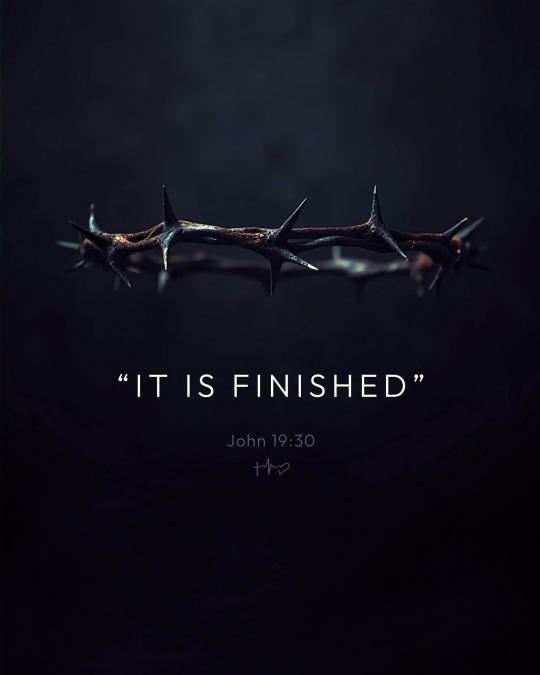
“Father, forgive them, for they do not know what they are doing.” (Luke 23:34)
Betrayed and abandoned by his closest friends, Jesus stands silent before Pilate in the face of false accusations.
He willingly accepts the brutal death sentence given to the most serious criminals in the Roman Empire—crucifixion.
Beaten, scourged, and crowned with thorns, Jesus carries the cross through Jerusalem’s familiar streets—the heavy wood pressing into His open wounds.
Just days ago, along these streets, crowds praised His entry as king with palm branches, shouting, “Hosanna!”
How quickly the people’s cheers turned to jeers, now demanding: “Crucify him! Crucify him!”
The city is abuzz with preparations for the great Passover feast to remember how God saved His people from their slavery in Egypt. As is the case year after year, families’ unblemished lambs are secured and prepared for sacrifice.
Meanwhile, another unblemished lamb—the Lamb of God—was also preparing for His death.
But His life wasn’t being taken from Him. Instead, He was willingly laying Himself down for the sins of the entire world.
Outside the walls of Jerusalem, at Golgotha—“Place of the Skull”—Jesus is nailed to a cross and lifted high for all to see.
He accepts a public, humiliating, and slow execution between two criminals. The sin of all of humanity weighs heavily on His shoulders.
A sinless man willingly embraces a death we deserved.
Every drop of His precious blood pours out as payment for a debt we could never pay.
Soldiers mock Him and cast lots.
Bystanders taunt Him: “Come down from the cross, if you are the Son of God!”
But the Savior patiently endures, hanging between heaven and earth, life and death, for six grueling hours.
The sky darkens. The ground shakes.
“It is finished,” Jesus says as He breathes His last.
Love held nothing back.
“At that moment, the curtain in the temple which separates God and man was torn from top to bottom.”
The people scatter. It is done.
Evil thinks it’s won.
Yet not a defeat as many thought.
It. Is. Finished.
But our Savior was not.
--------------------------------------
Bible verses referenced:
Matthew 21 & 27
John 19:28-30
31 notes
·
View notes
Note
What if Bella had John Coffey's powers, but was also simple minded like him as well?
John Coffey is a Jesus metaphor, Bella Swan is not.
John Coffey is a man who never sinned, who devoted his existence to loving even the smallest creatures and using his power to help others. He is sentenced to death, and forgives his executioners. The narrator, a prison guard at the death row who realizes that John Coffey is innocent but is powerless to save him, is Pontius Pilate.
More pointedly, John Coffey is a black man accused of raping and murdering two little girls, who never stood a chance against the justice system. The Green Mile is a commentary on racism, using a Jesus metaphor.
There's no way to separate his powers and simple mindedness from the story and giving them to Bella without massively insulting the point King tried to make, I hope you understand why I feel this way.
80 notes
·
View notes
Text
Daily Scripture Readings and Lives of the Saints for Friday, April 18, 2025
Strict Fast
Feasts and Saints celebrated today:
Holy Friday
Holy Father John the Righteous, disciple of St. Gregory of Decapolis
Euthemios the Enlightener of Karelia
Cosmas, Bishop of Calcydon
John the New Martyr of Epiros
Athanasia the Wonderworker of Aegina
Readings for today:
St. Paul's First Letter to the Corinthians 5:6-8
Matthew 27:62-66
Holy Friday
Reading from the Synaxarion:
When Friday dawned, Christ was sent bound from Caiaphas to Pontius Pilate, who was then Governor of Judea. Pilate interrogated Him in many ways, and once and again acknowledged that He was innocent, but to please the Jews, he later passed the sentence of death against Him. After scourging the Lord of all as though He were a runaway slave, he surrendered Him to be crucified.
Thus the Lord Jesus was handed over to the soldiers, was stripped of His garments, was clothed in a purple robe, was crowned with a wreath of thorns, had a reed placed in His hand as though it were a sceptre, was bowed before in mockery, was spat upon, and was buffeted in the face and on the head. Then they again clothed Him in His own garments, and bearing the cross, He came to Golgotha, a place of condemnation, and there, about the third hour, He was crucified between two thieves. Although both blasphemed Him at the first, the thief at His right hand repented, and said: "Remember me, O Lord, when Thou comest in Thy Kingdom," to which our Saviour answered, "Today shalt thou be with Me in Paradise." As He hung upon the Cross, He was blasphemed by those who were passing by, was mocked by the high priests, and by the soldiers was given vinegar to drink mixed with gall. About the ninth hour, He cried out with a loud voice, saying, "It is finished." And the Lamb of God "Which taketh a way the sin of the world" (John 1:29) expired on the day when the moon was full, and at the hour when, according to the Law, was slain the Passover lamb, which was established as a type of Him in the time of Moses.
Even lifeless creation mourned the death of the Master, and it trembled and was altered out of fear. Yet, even though the Maker of creation was already dead, they pierced Him in His immaculate side, and forthwith came there out Blood and Water. Finally, at about the setting of the sun, Joseph of Arimathea came with Nicodemus (both of them had been secret disciples of Jesus), and they took down the all-holy Body of the Teacher from the Cross and anointed it with aromatic spices, and wrapped it in a clean linen cloth. When they had buried Him in a new tomb, they rolled a great stone over its entrance.
Such are the dread and saving sufferings of our Lord Jesus Christ commemorated today, and in remembrance of them, we have received the Apostolic commandment that a fast be observed every Friday.
Apolytikion of Holy Friday in the Plagal of the Fourth Tone
As the glorious disciples, in the washing of the feet, were enlightened, the profane Judas, ravaged by greed, was benighted. And to the lawless judges he surrenders You the just judge. Consider, you who love money, the one who hanged himself for the sake of it. Shun the insatiate heart that could dare such a deed against the Teacher. Lord, benevolent above all humans, glory to You.
Kontakion of Holy Friday in the Plagal of the Fourth Tone
Come, let us all praise Him Who was crucified for us. Mary beheld Him on the Tree and said, "Though You endure even the Cross, You are my Son and my God."
The content on this page is under copyright and is used by permission. All rights reserved. These works may not be further reproduced, in print or on other websites or in any other form, without the prior written authorization of the copyright holder:
Reading (c) Holy Transfiguration Monastery - Brookline, MA
Apolytikion of Holy Friday (c) Narthex Press
Kontakion of Holy Friday (c) Narthex Press
Holy Father John the Righteous, disciple of St. Gregory of Decapolis
Reading from the Synaxarion:
This Saint took up the monastic life from his youth and became a disciple of Saint Gregory of Decapolis (see Nov. 20). After his elder, Saint Gregory, reposed (in the first half of the ninth century), he came to Jerusalem and finally reposed in peace in the Monastery of Saint Chariton.
Apolytikion of John the Righteous in the Plagal of the Fourth Tone
The image of God, was faithfully preserved in you, O Father. For you took up the Cross and followed Christ. By Your actions you taught us to look beyond the flesh for it passes, rather to be concerned about the soul which is immortal. Wherefore, O Holy John, your soul rejoices with the angels.
The content on this page is under copyright and is used by permission. All rights reserved. These works may not be further reproduced, in print or on other websites or in any other form, without the prior written authorization of the copyright holder:
Reading (c) Holy Transfiguration Monastery - Brookline, MA
Apolytikion of John the Righteous (c) Narthex Press
Prayer Before Reading Scripture
Shine within our hearts, loving Master, the pure light of Your divine knowledge and open the eyes of our minds that we may comprehend the message of Your Gospel. Instill in us also reverence for Your blessed commandments, so that having conquered all sinful desires, we may pursue a spiritual life, thinking and doing all those things that are pleasing to You. For You, Christ our God, are the light of our souls and bodies, and to You we give glory together with Your Father who is without beginning and Your all holy, good, and life giving Spirit, now and forever and to the ages of ages. Amen.
Epistle Reading
The Reading is from St. Paul's First Letter to the Corinthians 5:6-8
BRETHREN, a little leaven leavens the whole lump. Cleanse out the old leaven that you may be a new lump, as you really are unleavened. For Christ, our paschal lamb, has been sacrificed. Let us, therefore, celebrate the festival, not with the old leaven, the leaven of malice and evil, but with the unleavened bread of sincerity and truth. (Galatians 3.13-14) Christ redeemed us from the curse of the law, having become a curse for us - for it is written, "Cursed be everyone who hangs on a tree" - that in Christ Jesus the blessing of Abraham might come upon the Gentiles, that we might receive the promise of the Spirit through faith.
Gospel Reading
The Reading is from the Gospel According to Matthew 27:62-66
On the next day, that is, after the day of Preparation, the chief priests and the Pharisees gathered before Pilate and said, "Sir, we remember how that impostor said, while he was still alive, 'After three days I will rise again.' Therefore order the sepulcher to be made secure until the third day, lest his disciples go and steal him away, and tell the people, 'He has risen from the dead,' and the last fraud will be worse than the first." Pilate said to them, "You have a guard of soldiers; go, make it as secure as you can." So they went and made the sepulcher secure by sealing the stone and setting a guard.
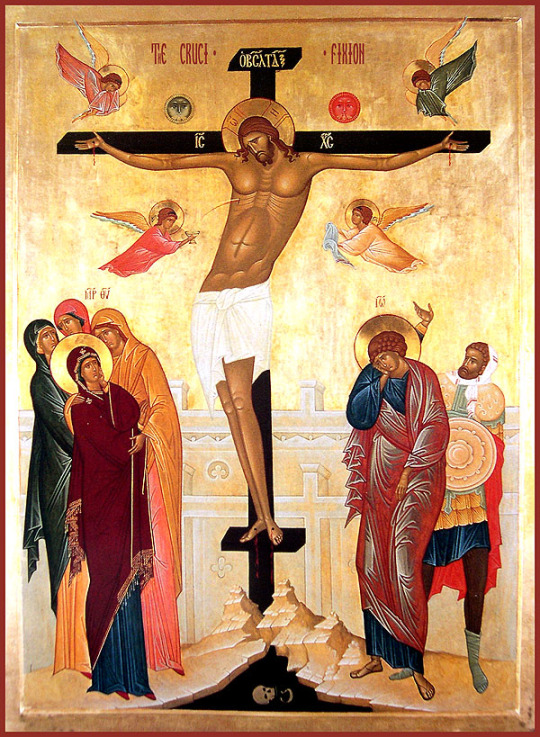
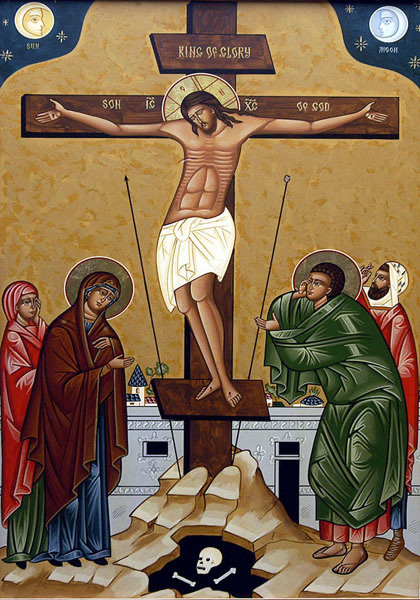
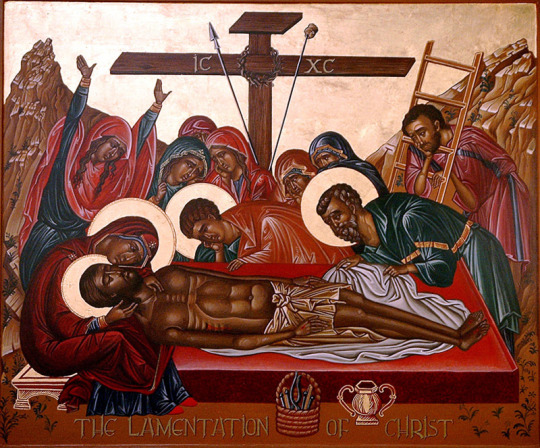
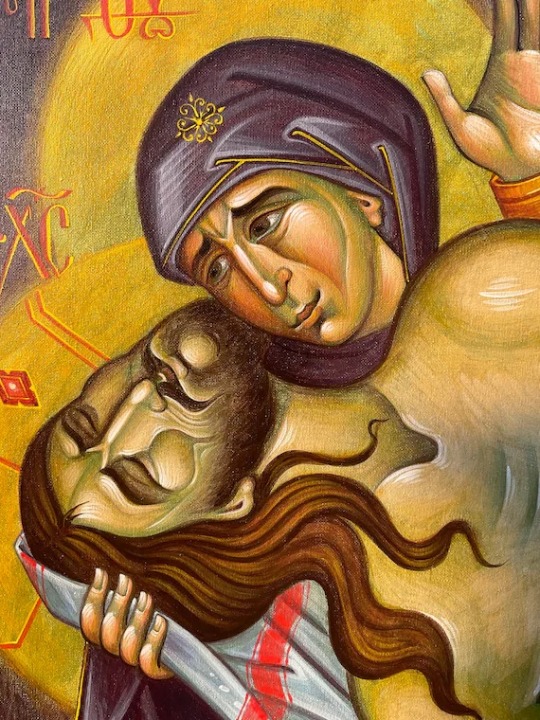
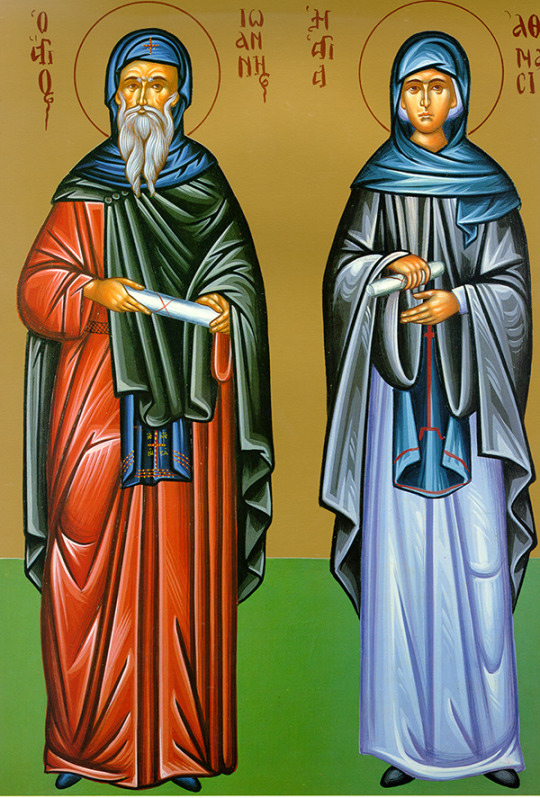
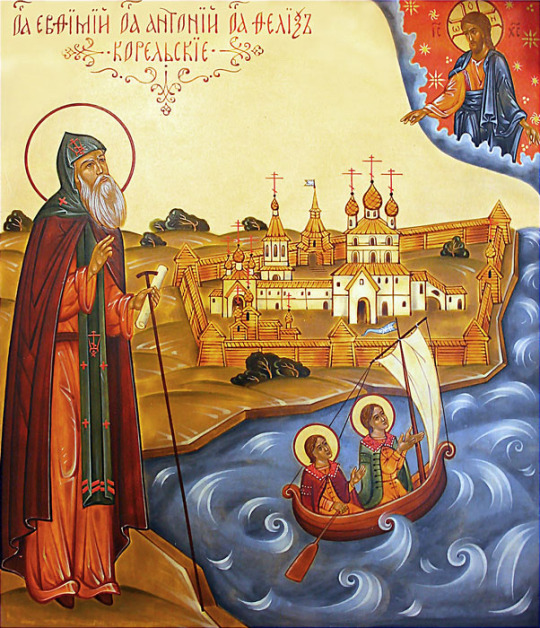
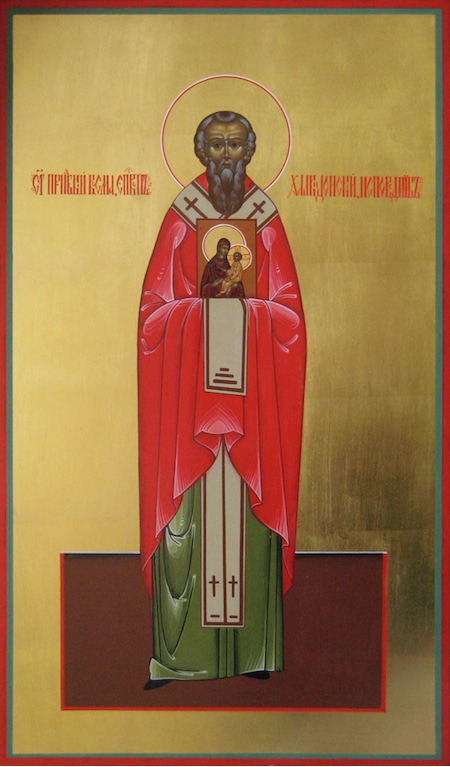
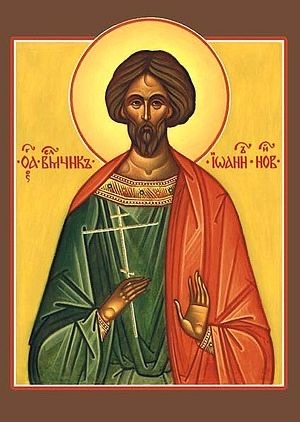
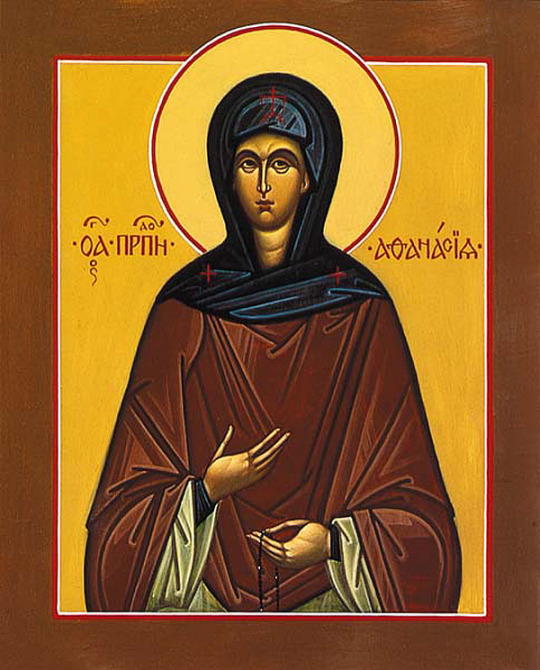
#christian blog#christian faith#christian living#christian quotes#christianity#orthodox#eastern orthodoxy#westvirginia#maryland#potomachighlands#ancient christianity#faith in jesus#lectionary#bible#scripture#holyscriptures#holy orthodoxy#daily reading#western maryland#md#wva#holy week#good friday#pascha#easter#crucifixion
7 notes
·
View notes
Text
I watched Judas (2004) and welp
So erm this was supposed to just be a couple sentences but ended up becoming a full-blown rant, please bare with me
WARNING: SPOILERS AHEAD AND BRIEF MENTIONS OF SUICIDE ⚠️
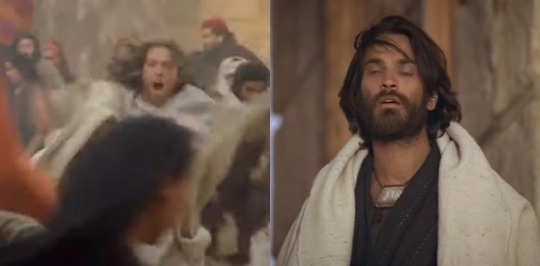
So basically it all started when Judas saw Jesus going bonkers in the temple and got really horny-
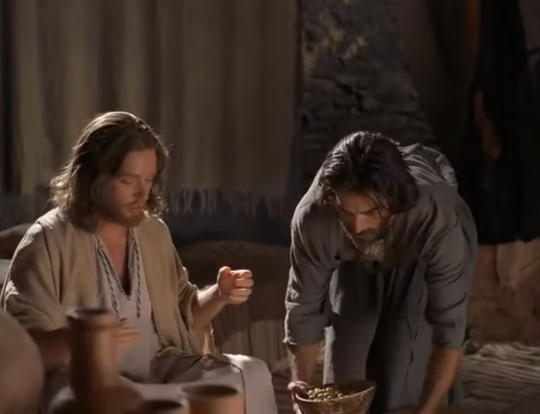
Then he decided to invite Him back to his place for some grapes (malewife mode activated)
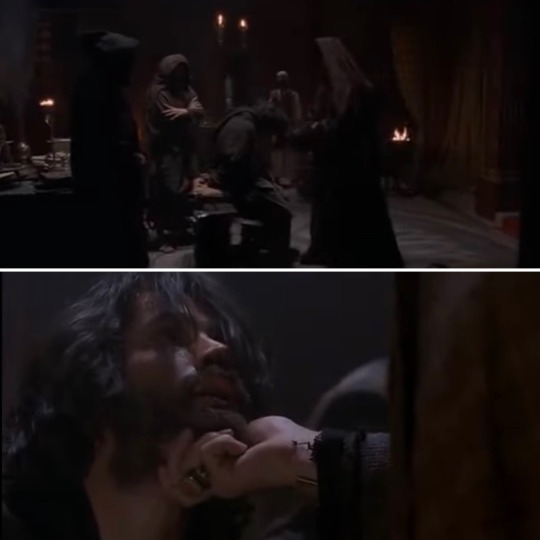
Afterwards Caiaphas and co. abduct Judas (this happens a total of three times) and attempt to blackmail him
Caiaphas calls Judas ‘son’
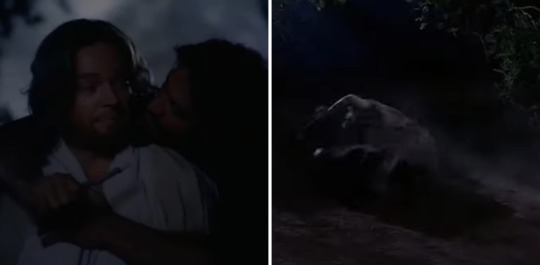
Judas ignores Caiaphas and runs away with Jesus. They start play-fighting and end up wrestling on the ground
Jesus says “I want you to spend eternity with me“
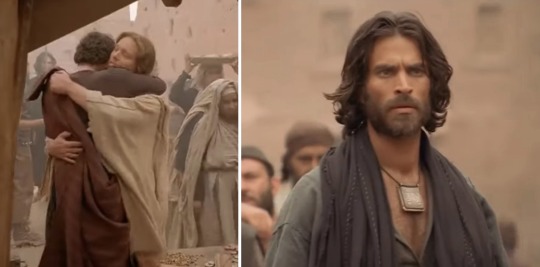
Unfortunately the harmony is short-lived. Judas sees Jesus hugging Matthew and gets jealous
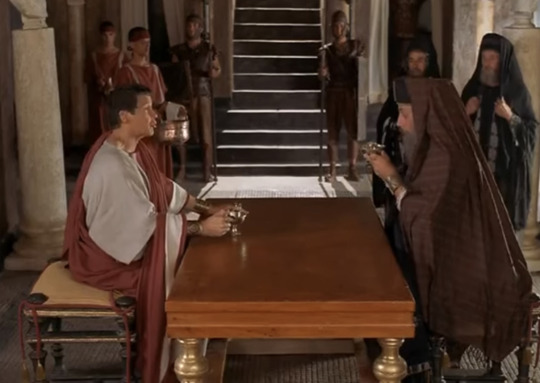
Pilate, Herod and Caiaphas regularly get together for tea and crumpets
Here Judas is basically the stand-in for Simon Zealots. We learned that his father died in an attempt to stir up a Jewish insurrection. Flower!child Jesus asks Judas why he’s staying despite their contradicting beliefs and he replies: “I’m drawn to you like a thirsty horse to a riverbed” 😳
Babygirl 🌸
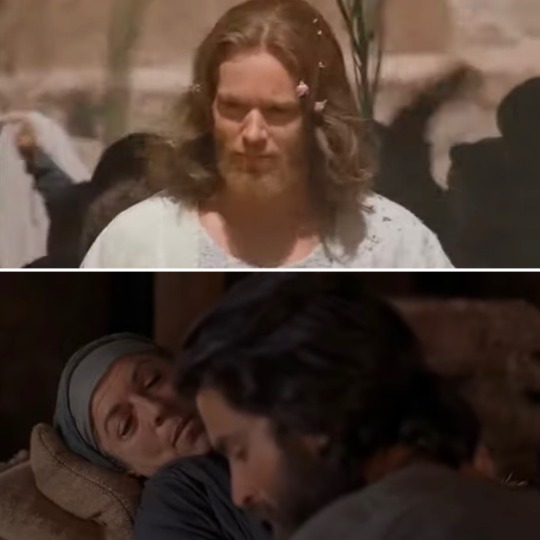
Supportive mama Iscariot tells her son he should invite his new boyfriend over for Passover, then promptly dies

OMG THE KISS
Judas really just smushed their faces together 🥴
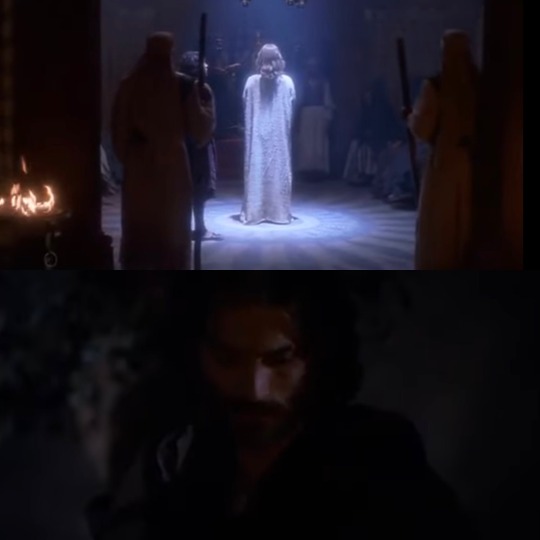
The cinematic choices here are really cool, Jesus is almost always surrounded by light Star Wars hologram lookin ass whereas Judas is consumed by shadow the edgelord
After turning Jesus in Judas instantly regrets it, and tries to get the apostles together to rescue Him. It doesn’t work (obviously) so he screams and cries his way through the trial before going to hang himself
His last thought is of Jesus asking him to join the Eternal Kingdom 🥺
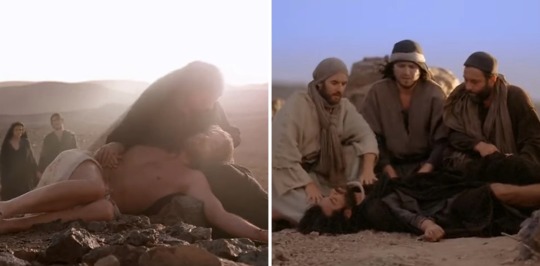
JESUS AND JUDAS’ DEATHS PARALLEL EACHOTHER
The disciples take Judas down because they know it’s what Jesus would have wanted, praying for him as the screen fades to black
The end 🥲
Conclusion
Judas has the vibes of an early 2000s made-for-tv movie (which it is) so I got what I came for. Definitely a fun ride if you like JCS and want to see attractive people acting out a biblically-inaccurate rendition of The Passion in the style of Gladiator (2000) or Troy (2004). The language used is modern, everyone speaks in American or English accents. Pilate even uses the term ‘rabble-rousing’ Overall I give Judas 18 silver pieces out of 30, for being corny and anachronistic but homoerotic enough to satiate all the freaks out there like me
To think this all could have been prevented if Judas just took his iron pills
Bonus quotes:
“Don’t leave me, I thought I was special to you!”
-Judas
“I wish you could love yourself the way I love you.”
-Jesus
P.S. I’ve seen Jonathan Scarfe referred to as ‘the whinier Glenndas’ so please proceed with caution if you do plan on giving it a watch! Here’s the link:
#okay I think that’s everything#judas movie#the passion#jesus christ#judas iscariot#jesus chris superstar#bible posting#jonathan scarfe#johnathon schaech#television drama#caiaphas#pontius pilate#king herod
155 notes
·
View notes
Photo
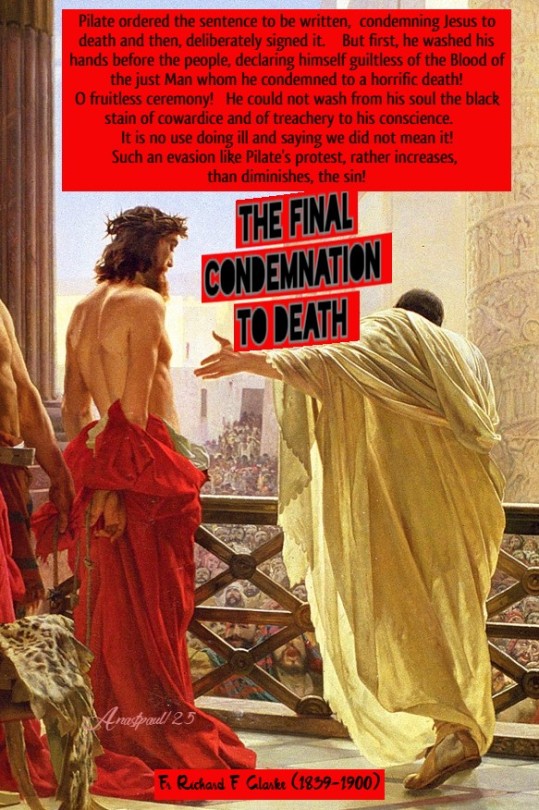
(via Lenten Meditations – 5 April – The Final Condemnation to Death)
+1. Pilate tries first one plan, then another, to avoid passing a sentence which he knew to be unjust. One plan after another fails and now, he is brought face-to-face with a choice on which the salvation of his soul may well depend. It was the turning-point in his life: the grace of God urging him on one side and, on the other, fear of man. . So, in the life of each, there is some turning-point, some occasion, when the choice made, will decide his future, both in life and in eternity. Unhappy those who, in such a moment, choose as Pilate chose!
+2. The motive which led Pilate to condemn Jesus, was the fear of man. He did not dare to face the consequences of doing his duty. He trembled before the opinion of others and the dread of losing his worldly position and honour To how many has the same motive been a cause of eternal loss! Is it not one before which I have sometimes quailed, loving honour from men and failing in what I knew was the Will of God, from a desire to please others?
5 notes
·
View notes
Text
A Sentence That Wasn't A Sentence: Was Pilate Complimenting Jesus?
One of the most unusual testimonies about who Jesus was is expressed in a short sentence that wasn’t a legal sentence: “I find no fault in this man.” Consider the reactions of Pontius Pilate and his wife: “While he [Pilate] was sitting on the judgment seat, his wife sent him a message, saying, “Have nothing to do with that righteous Man; for last night I suffered greatly in a dream because of…
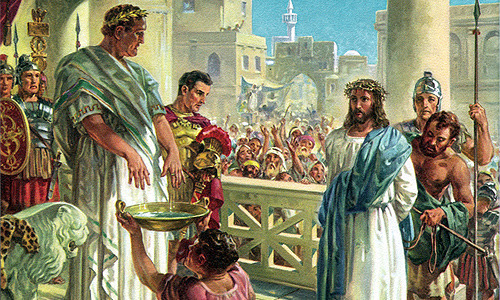
View On WordPress
#eyewitness#Jesus#John 18:36-37#John 19:11#Luke 23:3-4#Matthew 27:19#Pontius Pilate#sentence#testimony
1 note
·
View note
Text
How to recognise organized harassment on tumblr (on example from hetalia, the most normal fandom):
First of all, it often starts with "Block this person!" Often with many exclamation marks. Never "please be aware". That's not the accusing who should be responsible for your decisions to block/not block.
Secondly,

There are too many accusations at once. This one example of wording sounds hilarious. There is some recognisable pattern in such a kind of harassment: you are necessarily being accused of transphobia + racism + islamophobia/zionism. All these accusations in a 1 post at once are a red flag, you should check the information very precisely and objectively. Otherwise, you have a very high risk of participating in harassment and misinformation's spread about innocent people.
Like, I've seen callouts about tankies/vatņiki and they are VERY different from organized harassment.
Thirdly, if there is more text from the accusing than actual screens/links - that's also a red flag - you shouldn't share the post immediately. Those who harass innocent people want you to believe that if you don't share the callout post right here, right now, the world is gonna collapse. It's not. Check the information.
Fourthly,

Wtf is this. It's not even recent? You are just bored and you want to make a fuss? Red flag. I would not trust the author after this. Five sentences ago, you encouraged us to "block this person!!!" - and now you say "I'm urging y'all not to block"? Sure, grandma, let's get you to bed.

No, my dear, the only person with dangerous views trying to hide behind "valid criticism" is you. Once again, "just block this person", right after "don't block this person".
Anyway, organized harassment doesn't necessarily have a lot of profanity because assholes became a bit smarter. Organised harassment makes an accent on rather the personality of the accused than the actual deeds. Organised harassment uses the Pontius Pilate's rhetoric. Organised harassment makes it a show, a Broadway musical, "Jesus Christ Superstar", leaves the accused no opportunity to explain themself, and leaves the people no opportunity to ask the accused.
There are surprisingly many people who cooperate with each other in harassment. Organized harassment makes its authors feel like they have some power. Maybe because in real life, they are too wretched.
Even if the accused actually has weird views, such a callout post makes me too disgusted with the author to share it.
Please don’t participate in harassment. Please check the information.
P.S. Accusations of zionism? Has anyone ever tried to ask Jews what is zionism? It's like accusing of patriotism. I accuse the author of the post of anti-Semitism.
P.S.S. I think I've seen the author sharing "how hetalia characters would sing in their native language" (AI covers), but I'm too lazy to search.
52 notes
·
View notes
Text
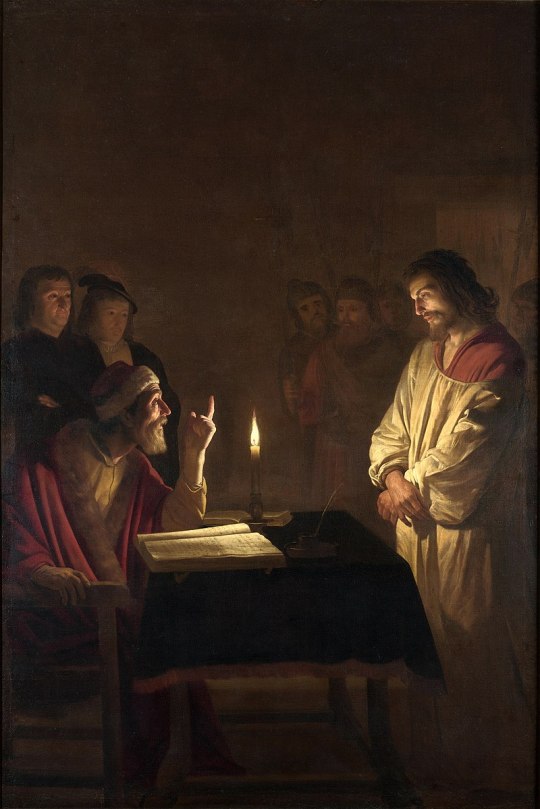
Christ Before the High Priest
Artist: Gerard van Honthorst (Dutch, 1592-1656)
Date: circa 1617
Medium: Oil on canvas
Collection: The National Gallery, London, United Kingdom
Description
Christ Before the High Priest is an oil on canvas painting by Dutch artist Gerard van Honthorst, created around 1617. It now hangs in London's National Gallery. It depicts Jesus Christ being questioned by the High Priest Caiaphas shortly before being sentenced to death.
Who was Caiaphas?
Caiaphas was the son-in-law of Annas, the former high priest, which may have accounted for his own rise to power. Caiaphas was also a member of one of the ruling Jewish sects, the Sadducees. Sadducees were often wealthy men of high position and, as they sought to appease their Roman rulers, were heavily involved in politics. They held the majority seat in the Sanhedrin, the Jewish high court, over which Caiaphas ruled for the 18 years he served as high priest. In terms of theology, Sadducees denied the afterlife and any existence of the spiritual world (angels, demons, etc.). Because of these things, they were often at odds with Jesus due to His teachings about humility, heaven, and His own deity.
When the Jewish leaders had Jesus arrested at Passover, they first brought Him before Annas. After he had questioned Jesus, Annas sent Jesus to his son-in-law Caiaphas, who as the high priest would be the one to rule on Jesus’ fate. When Jesus stood before Caiaphas and the entire Sanhedrin, many false witnesses were brought forward, but nothing was found to warrant a death sentence (Matthew 26:59–60). Finally, Caiaphas stood up and addressed Jesus directly, “I charge you under oath by the living God: Tell us if you are the Messiah, the Son of God” (verse 63). Jesus replied just as directly, “You have said so... But I say to all of you: From now on you will see the Son of Man sitting at the right hand of the Mighty One and coming on the clouds of heaven” (verse 64). Caiaphas had what he was looking for; he tore his robe and cried, “Blasphemy!” (verse 65). The result of the sham trial was that Jesus was pronounced “worthy of death” and beaten and mocked (verses 66–67). However, since the Jews could not legally execute prisoners, Caiaphas sent Jesus to the Roman governor Pontius Pilate.
#christ#caiaphas#table#book#candle#17th century painting#new testament#gospel of matthew#christianity#gerard van honthorst#dutch painter#christian art#painting#oil on canvas#narrative art#biblical scene#biblical art#fine art#oil painting#artwork#conversation piece#men#robe#candlelight#chair#dutch culture#dutch art#european art#the national gallery london
19 notes
·
View notes
Text
sam and drake as the trial before pilate; or, an analysis of the powerplant incident
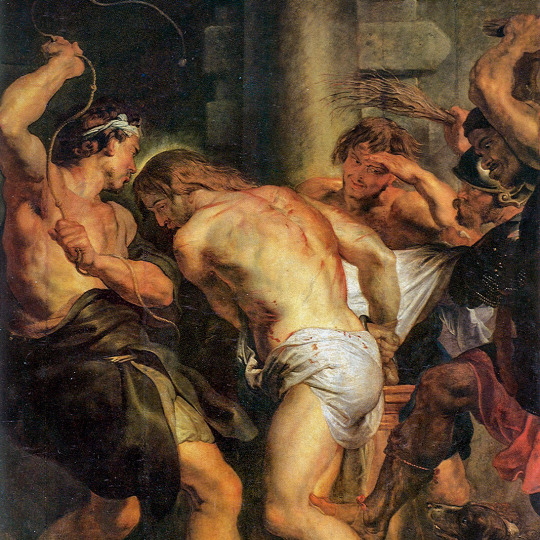

religion is all over gone. it's there in abundance, from the names to the internal dialogue to the very acts and events that happen. the overlap of traditional religious idiosyncracies between different characters are so plentiful it is difficult to sit here and say that this character represents this religious figure; they are an amalgamation of different gospels, showing how theology and the themes of the bible can apply to gone as a wider subject matter to stretch out the dystopia, show how the worst of people brings out the very humanity of them.
as such, i don't know for certain if this parallel or idea was intentional or ever in MG's mind as he wrote the scene, but it is something that has stuck with me a lot in my reread: how the drake/sam whipping in the powerplant strongly mirrors jesus' trial before pilate. the extract sticks out to me particularly in terms of understanding how the whipping of sam impacted his arc and his character for the rest of the novel. full disclaimer, i am not an expert in christian theology nor am i christian, and this comparison only came to my mind recently, so it may not have the depth and nuance of others, but it’s something i have thought and researched a lot about, so i hope it will suffice!
under the cut i go into some brief religious context, followed by how this fits in with the scene in the powerplant alongside quotes pulled from the various books to underscore how pivotal the lashings were for sam. so, if you're looking for some unnecessarily deep analysis of sam and drake as religious paragons: look no further than under the cut!
pilate's court: a contextual debrief
for starters, what was the trial before pilate? in brief, it is as follows. in the christian gospels they refer to the final period before jesus' death as 'the passion'; or, 'the passion of jesus'. the passion includes jesus' entrance to jerusalem, his anointing, the last supper, his agony and arrest, for example. it does also include his trial before pilate, the governor of judaea.
this trial is what essentially preceded the denouncement of jesus before he was sent to be crucified. throughout the trial, much to pilate's confusion, jesus was silent, perhaps accepting his inevitable fate or not seeing reason to protest something when he knew he would never win. pilate, at first, didn't believe there to be enough reason to sentence jesus to death and, consequently, elected to flog him as punishment. the bible does not outright state the amount of lashings jesus received, but it is thought the number could have been 39 (due to jewish commands restricting the amount of flogs from surpassing 40).
and so jesus was lashed, and then he was sentenced to death. it is widely agreed that the punishments jesus endured represent him absorbing everyone's sin, seeing him become the icon of rebirth and allowing humans to start all over again.
so, i hear you ask... how does this relate to the drake and sam incident in the powerplant?
drake as judge, jury & executioner
as i mentioned before, i'm not here to say that sam and drake are direct reflections of jesus and pilate. quite the opposite is true, really, and it is more the themes rather than the behaviours and characteristics that tie them together with this gospel. the theory and symbolism behind the trial before pilate can apply in a somewhat inverted way; sam is whipped though he doesn't necessarily die (more on that later), and drake isn't necessarily trying to find ways to punish sam without killing him as pilate was for jesus. drake wants sam dead and, had brianna not interfered when she did, he probably would have killed him. the events at the powerplant are not a complete mirror image of the trial but are, rather, foils to it.
the lashing of sam sees drake attempting to denounce all the perdido beach kids, trying to assert a specific way of thinking over the whole fayz. whether that be the beliefs of caine and the coates clan or the legislation of the gaiaphage is up for debate, but he is still decidedly torturing sam in response to disagreeing with the word he is spreading and the way he is leading. in the same way the roman crowds saw jesus’ behaviours as undermining the king ceasar, drake is acting out as he sees sam undermining his own personal king.
in terms of the text, this all occurs within hunger. however, before diving into that, i'm flashing forward to plague for an interesting excerpt from a conversation between brittany and astrid. it is, in fact, the very passage that got me thinking about all this to start with:
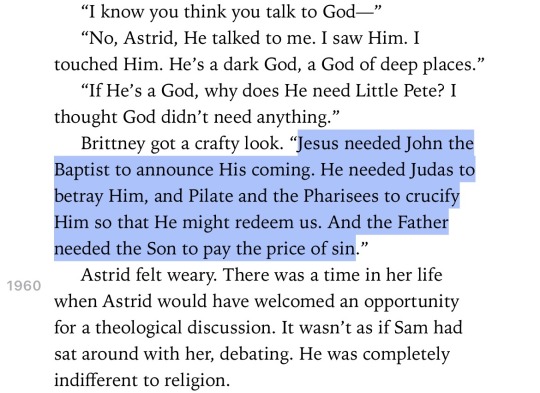
here we have a direct reference to pilate in the books themselves! how crazy is that? pay attention here to the specifics of "and pilate... to crucify him so that he might redeem us." if, in this instance, we are perceiving sam as a jesus-emblem, what brittany is essentially saying here is that sam needs to be punished for hope he might redeem all people. all the perdido beach kids, all the fayz inhabitants.
sam stands to be the symbol for all those who follow him. he is a leader, first and foremost, but he is at base level the most direct representation of all the lives he, begrudgingly, protects. sam is a microcosmic perdido beach resident while also being one of the most powerful mutants. see, then, how jesus is said to represent all despite being the son of god.
the lashing of sam kickstarts the redemption of the fayz kids, even so early into the book series. this happens in hunger, before any of the real horrors begin, but it is in this scene when the tides perhaps turn and the chance of a tunnel out of here manifests within sam's mind. the lashing is part of the passion of jesus, or the passion of sam, and as a result it sets him on a different path that places him in the mindset to understand that murdering drake is something which must happen in order for the barrier to come down. even if he doesn't quite have the foresight to see it at the time - perhaps more focussed on the murder angle rather than the reason - the seeds for drake's death are set in motion right here at the end of hunger.
just to contextualise the whipping within the timeline of the book. it starts halfway through chapter thirty-seven, with 1 hour and 6 minutes before the climax of the novel. brianna appears at the end of the chapter. thirty-eight sees us with 53 minutes later. so, with that knowledge, we can assume that the lashing lasted, at most, thirteen minutes. brianna administers the morphine packet within this chapter, too.
so, after about fifteen minutes since the lashings began he gets his first pain medicine. in thirty-nine (47 minutes) he wasn't feeling particularly intense pain as he was starting to hallucinate. at 33 minutes, he is still under morphine but is once again in pain. note: 33 minutes is when he first declares his intent to take a life. this is, obviously, a very instrumental part of sam's character arc. when he goes from seeing killing as something to be done only as mercy, to put someone out of their misery, to something that is to be done to avenge.
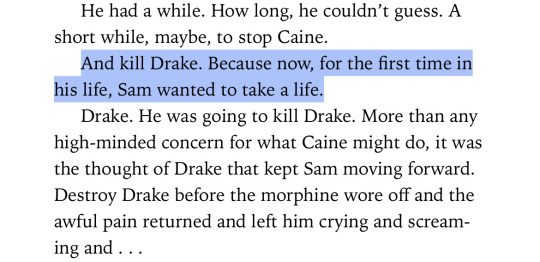
sam notes that the morphine is wearing off with 7 minutes left. so, with all this textual information in place, we can determine that he underwent torture for approximately thirteen minutes, and saw the pain mostly off with a dose of morphine that lasted 46 minutes. it's important to note also, i think, that this lashing happens concurrently with the human crew hunting and essentially sentencing hunter to death in the church.
it is interesting that two heavily religious events are happening at the same time, especially as the events are both underscored by the overarching sense of sacrifice, lawfulness and establishing dominance. the human crew are wanting to metaphorically crucify hunter while drake is flogging sam: they both want to be the power in charge, and they do so without taking into account any jury or justice. they act singularly, for their own gain.
the first 'death' of sam temple
now, earlier up, i mentioned that sam "doesn't necessarily die". he is, after all, not crucified or murdered in any way, he is just flogged. however, i believe that he was fundamentally changed after his encounter with drake, and while he didn't perhaps die physically he did die mentally.
he was on the brink of real death, all but bleeding out on the powerplant floor, and spent at least 46 minutes in a sort of purgatory state where he was hallucinating his better moments in life and wondering if he was going to make it. under the effects of morphine he sees the school bus incident, perhaps a demonstration of him walking towards the light before he awakes and finds himself back in the powerplant.
the lashing of sam is unequivocally the worst experience he endures in his time in the fayz. the worst experience of his whole life, something that shifts his entire perspective of not only drake but also the type of pain he can endure. the memory of it lasts even through light:

even after everything - four more whole books of action - nothing lives up to or usurps the agony of his lashing in the powerplant. it does not kill him, but it kills his soul. similarly to how the darkness kills lana and sucks the light from her life, sam's experience with drake does the same for him.
taking this back to the gospels, then, jesus is battered and bruised when he gets to the crucifix and, as a result, doesn't last long up there. sam is similarly battered and bruised, literally on his last legs of life after drake is done with him. brianna is able to come and administer the morphine and bring him back to physical life, but he is psychologically different after the whippings. jesus's trial before pilate is a distinctive turning point in christian theology; it is where he essentially admits to his fate, refuses to put up a fight, and leaves the ending of his life in the hands of pilate. he understands that his people have given up on him, that he has lost the crown of king of the jews, that he has been so betrayed by those closest to him. and, yet, in the aftermath of the trial and even after the crucifixtion and rebirth, jesus is different. the world is different. it turns into a place where a better ending rests at the end of all the trials and tribulations.
sam accepts his fate. sam understands that he is losing control of perdido beach. if drake wasn't the one to beat him down, the human crew probably would've tried to at some point. in this analogy where drake is a twisted version of pilate, the human crew are perhaps the crowd outside the temple who are calling for the death of jesus; the death of sam. for fifty-nine minutes sam was reduced to nothing but a boy bruised. he was no longer a four-bar mutant, he had no use of his hands, and he was no longer school bus sam either. he was just sam temple, a fifteen-year-old kid dying on the floor at the hands of someone who took it upon themselves to play judge over his life. jesus, in his trial, became the same thing. just a person enduring the worst sort of torture. god couldn't save him, didn't save him, nor did his people or his reputation or his powers.
the powerplant scene puts the fayz over the precipice. it sends drake down a path from which he never recovers, and it pushes sam to the brink of something he almost doesn't save himself from. it sets in stone that sam will come back - stronger - and those who put him through the agony will repent for what they did. in such a short extract, MG essentially plots out the ending of their relationship: sam will prosper while drake will die.
so, overall
i could expand on this entire thing further because, as i said before, there is such an astonishing amount of overlapping religious theology in these texts that it's impossible to sum them all up in one go. but i like to think of this powerplant moment as an opening, as something thematically intrinsic in the way the rest of the novels work out. it's an instance which can be explored even more if one is to bring caine into the narrative too, and consider sam/caine as twin versions of jesus/judas. which doesn't even take into consideration the very on-the-nose naming of them as sam and david and the way that gospel plays into the whole series, too.
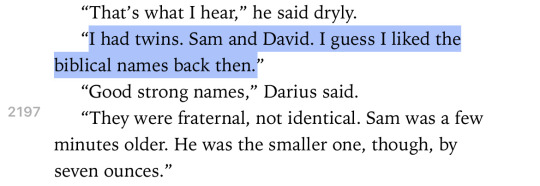
i could even bring in one of my favourite pieces of artwork, the angels hovering over the body of christ in the sepulchre by william blake, and perhaps analyse how the angels are symbolic of drake/brittany in later novels, how their constant back and forth as they oversee the rebirth of sam as he conquers them, and the fayz.
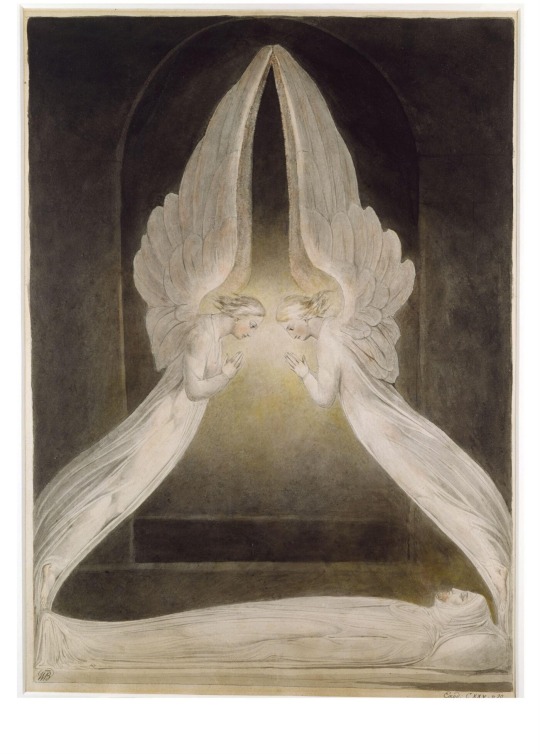
anyway… gone is crazy detailed when you look at it through these sorts of theological lenses. i think, to a certain extent, some of the overlaps must be intentional. the fayz is very much a microcosm of particular religions, of the way gods contend against each other and leaders prevail against crowds of opposition.
either way, to conclude: the meeting between drake and sam in the powerplant greatly mirrors the trial of jesus before pilate, just before his crucifixtion. it perhaps represents how sam is forced to shoulder the sins and the misgivings of the perdido beach kids in order to see through to a way of beating the darkness and freeing them from the barrier. though neither drake or sam are perfect reflections of pilate and jesus respectively, the way their actions correspond to and follow those of the gospels brings to surface really interesting observations about the ways the characters and their fates are almost predetermined, how you can see how the books will end even from only the second one in the series.
#gone michael grant#the fayz#the gone series#gone series#sam temple#drake merwin#caine soren#mini essay#this got very wordy! sorry!#i went off on one slightly#musings#sam#drake
31 notes
·
View notes
Note
Jesus🚶♂️🤩 is about to DIE😵☠️ for your sins😩😏 so get it out now, sweaty💦😇 It’s GOOD Friday📆✝️ bitches but you better be real👅 fuckin’😳 BAD😈 So get your hands wet💦🙏💦 with some🌊holy water🌊 grab on to His big👁 WOODen🌴✊ cross✝️ and suck 😛😫on some ❤️c🧡o💛l💚o💙r💜f❤️u🧡l💛 hard😟 Easter eggs🥚ω🥚 STRAP👡💆♂️ on your crown🤴👑 of hornys🐏😈 and give Peter🐰🌷 some good 🐇cottonTAIL🐇 Pontius Pilate🧝♂ is about 2️⃣ sentence YOU to 6 🕕 hours of NAILING🔨🔩 Judas🤫 will be Roman around your bedroom waiting👤 to STAB🔪you in the back with his big🐘 THROBBING🌚 peep🐣🍆 Put 🕳holes🕳 in MY hands🤲 and i'll put my hands🙌 in YOUR 👉🍩holes🍩 You better be FUCKIN’ ✝️ hung🍆👀 cuz it’s gonna take😯 you to your last breath😵💨 Send this💌 to your top 1️⃣0️⃣holiest HOES😇 or Jesus🏃♂️🧟♂️ won’t take you to his ⚰️tomb😉😜 this Easter🐰😲
I.......
19 notes
·
View notes